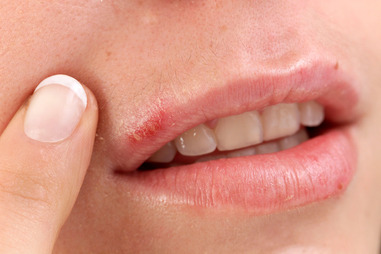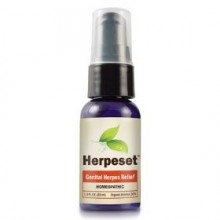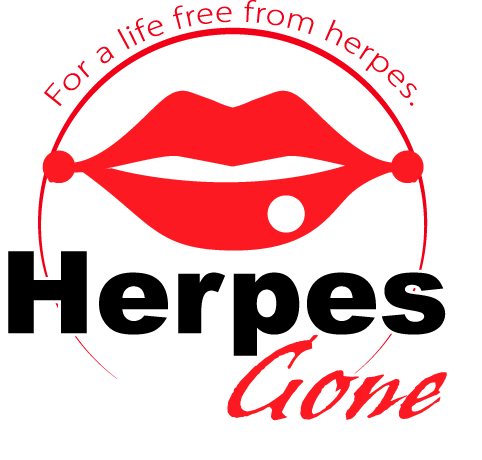Dealing with a herpes outbreak can be uncomfortable and embarrassing. You’re at your most contagious during an outbreak. So avoiding intimate contact with loved one’s is the only way to avoid passing it on. That will probably have you asking how long do herpes outbreaks last.
Not only does this affect your love-life, but it can make you feel alone and depressed. But it doesn’t have to be like this. When you know what to expect from a herpes outbreak, it becomes easier to manage. So let’s begin with the difference between primary and recurrent outbreaks.
Table of Contents
How Long Do Herpes Outbreaks Last (Primary)?

Cold sores are a symptom of herpes.
Occasionally, you may be infected with herpes and not even realise it until you pass it on to someone else, or the virus is reactivated. But generally, you’ll experience a primary outbreak within 2 – 20 days after contracting herpes. This is usually the most severe and painful outbreak you will experience. And it may take 2 – 3 weeks for the sores to heal completely.
During this time the symptoms you may experience include:
- Tingling, burning and itching of the skin where the sores will appear.
- Small, fluid filled blisters will usually appear 24 – 72 hours after the tingling starts.
- Muscle aches, headaches, nausea, fever and a flu-like feeling.
- If you have genital herpes, you may have some pain when you urinate.
Although the sores will clear, the virus retreats into the body. It remains hidden in the ganglia of your nerves cells. From there it can be reactivated whenever your immune system weakens. This could be from exhaustion or illness. Some people also experience recurring outbreaks from exposure to sunlight. And women tend to have more outbreaks than men as it seems hormonal changes may reactivate the virus, too.
So you can expect flare-ups to occur, but these won’t be as painful as the primary outbreak. However, if your outbreaks occur frequently, or are very painful, you may want to seek further treatment.
How Long Does a Secondary Herpes Outbreak Last?
Thankfully, secondary outbreaks resolve faster than the primary outbreak. But it will still take 3 – 14 days for it to clear up. And you can expect many of the same symptoms such as:
- Tingling – this is a sign that the virus is active.
- Blistering – small blisters begin to appear and fill with fluid.
- Ulcers – as the blisters break, shallow wounds or ulcers may appear.
- Scabbing – the ulcers lead to scabs which will take some time to heal.
- Healing – you may notice that your skin becomes dry and flaky as it heals.
You can expect a recurrent attack within six months of the initial outbreak. And during the course of a year you can expect 2 – 3 more outbreaks. If you have more than five flare-ups in 12 months or less, your infection would be considered chronic. You may need medical advice to help you manage the symptoms.
For How Long Will I Be Contagious?

The duration of a herpes outbreak varies, but you and your partner can manage duration and severity.
Unfortunately, even when you’re not showing any symptoms, the virus can still be spread through contact with other people. To avoid passing you infections on to others, take the following precautions:
- During a flare-up, do not have any kind of sexual contact until the sores have healed.
- Always use a condom. While this may reduce your chances of passing the virus on, remember that a condom may not cover all of the sores on your body.
- Watch out for the tingling, itching and burning sensations which signal that a flare-up is coming on. Stop all sexual contact and wait until the outbreak has run its course.
It’s a good idea to get your partner tested. If you’re both infected with the same type of herpes, then you may not need to take medication to prevent infection.
Can Herpes Be Treated?
There are medications that a doctor can prescribed to help you manage the symptoms of a herpes outbreak. Unfortunately, that’s all they can do—manage the symptoms. You won’t find a cure and you’ll have to live with the fact that you may experience outbreaks for the rest of your life. Although many people find that their outbreaks decrease in severity and frequency over time, they’ll always be at risk of infecting the people they care about.
And the side-effects from these prescribed drugs can be even worse than the outbreak itself. Nobody wants to spend their life taking something that makes them ill. The different antiviral medications affect people in different ways and it may take some trial and error before you find one that works without making you sick.
What About Alternative Treatments?

A quick way to deal with a cold sore outbreak.
Herpes is certainly not a new disease and natural treatments that are safe and effective have existed for hundreds of years. Unlike the medication a doctor will prescribe they’re unlikely to cause any uncomfortable side-effects. And they’re more affordable than expensive antivirals.
If you already have an outbreak and you’re looking for something to soothe your blistered skin, you can try some of the following:
- Aloe vera: Available from your local drug store, aloe vera takes the sting out of herpes blisters and it’s a natural anti-bacterial agent.
- Witch hazel: Just dab it on the blisters with a cotton swab a few times a day and it will dry out the blisters, helping your skin to heal faster.
- Milk: Simple but effective, milk is packed with virus fighting immunoglobulins. And if you get right out of the fridge, the cooling effect will make you feel more comfortable.
But to get the core of the problem, which is the virus itself, you need something stronger. Herpeset is a convenient spray-application that combines the healing properties of natural plant extracts and homeopathic remedies. It’s both effective and gentle.
If your infection is chronic, and the meds your doctor prescribed are making you feel worse, then you should read The Ultimate Herpes Protocol. Melaine Addington experienced debilitating side effects from the medication her doctor prescribed. So together with her father, a conventional doctor, she worked on developing a protocol to strengthen the immune system and eradicate the virus from her body.
You might be infected with herpes, but that doesn’t mean you have to suffer with it. Natural treatments are available and they can help you cope with symptoms and reduce the chance of infecting others. Learn everything you can about herpes and your outbreaks will be a thing of the past.
